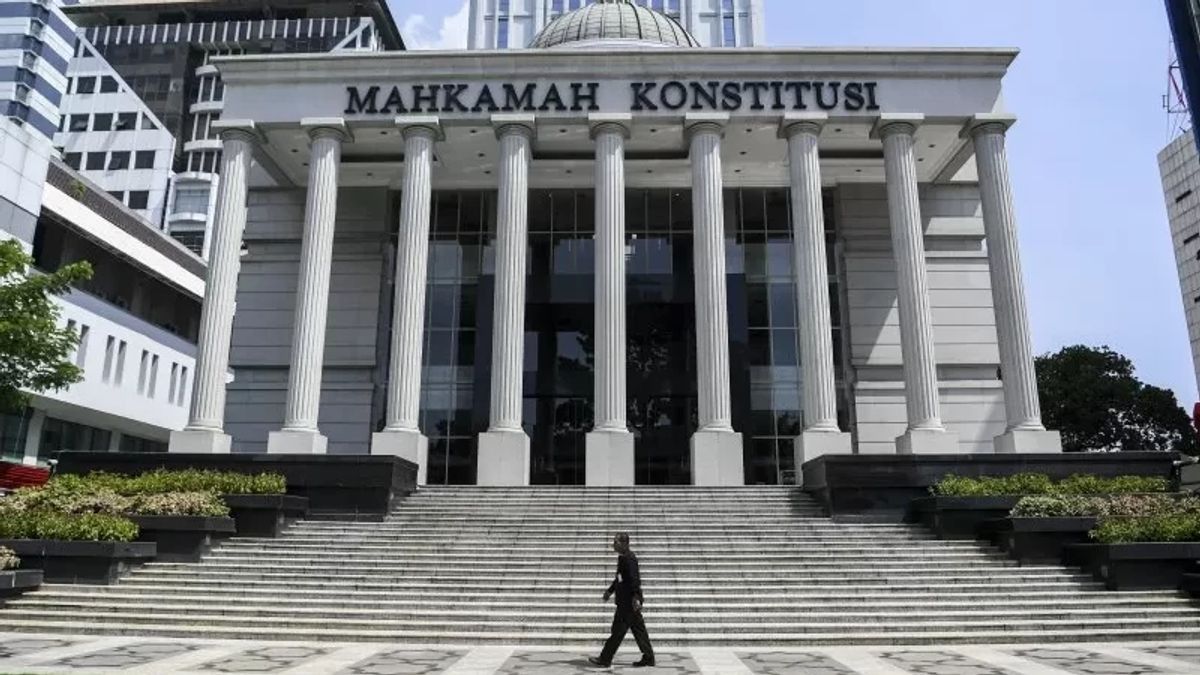YOGYAKARTA The Constitutional Court (MK) has just formed an Honorary Council of the Constitutional Court to investigate cases of alleged changes to the substance of the decision to remove former constitutional judge Aswanto.
The announcement of the establishment of the Honorary Council of the Constitutional Court (MKMK) was delivered directly by the Spokesperson for the Constitutional Court Enny Nurbiaringsih on Tuesday, January 31, 2023.
He said the formation of the Constitutional Court was regulated in Article 27 A of the Constitutional Court Law. In order to maintain justice, independence, and impartiality in investigating the alleged amendment to Decision Number 103/PUU-XX/2022.
"The resolution regarding the chronology or the occurrence of developing issues is not carried out by ourselves (MK), but will be resolved through the Honorary Council of the Constitutional Court," said Enny at a press conference at the Constitutional Court Building, quoted by VOI, Thursday, February 2, 2023.
The duties of the Constitutional Court Honorary Council
The Honorary Council of the Constitutional Court (MKMK) is a device formed by the Constitutional Court to maintain and uphold the honor, dignity, and code of ethics of constitutional judges related to reports regarding alleged serious violations committed by the reported judge or the alleged judge submitted by Dean Ethics.
This is stated in the Constitutional Court Regulation Number 2 of 2014 concerning the MKMK.
The duties of the Constitutional Court Honorary Council are in accordance with Article 12 of the Constitutional Court Regulation No. 2/2014, namely:
To carry out the duties referred to in Article 12, the MKMK has the authority:
Members of the Honorary Council of the Court
According to Article 8 of the Constitutional Court Regulation Number 2 of 2014, the composition of the Constitutional Court's Honorary Council consists of:
Case of Changes in Decision Substance
The case of alleged amendments to the decision of the Constitutional Court regarding the dismissal of Judge Aswanto originated from the issuance of case decision Number 103 / PUU-XX / 2022 concerning judicial review of Law Number 7 of 2020 concerning the Constitutional Court. In a copy of the decision, there is one phrase that is different from the court decision read by the constitutional judge on November 23, 2022.
The verdict read by the constitutional judge in a hearing held on November 23, 2022 reads:
"Thus, the dismissal of constitutional judges before the end of his term of office can only be done because of the reason for resigning at his own request submitted to the head of the Constitutional Court, physical or spiritual illness for 3 (three) months so that he cannot carry out his duties as evidenced by a doctor's certificate, and was dishonorably dismissed for reasons as stipulated in Article 23 paragraph 2 of the Constitutional Court Law...".
Meanwhile, a copy of the verdict published on the Constitutional Court website is:
"In the future, dismissal of constitutional judges before the end of his term of office can only be done because of the reason for resigning at his own request submitted to the head of the Constitutional Court, physical or spiritual illness for 3 (three) months so that he cannot carry out his duties as evidenced by a doctor's certificate, and was dishonorably dismissed for reasons as stipulated in Article 23 paragraph 2 of the Constitutional Court Law..."
This is information about the duties of the Honorary Council of the Constitutional Court. The Constitutional Court was formed to investigate cases of alleged changes to the substance of the decision to remove former constitutional judge Aswanto.
The English, Chinese, Japanese, Arabic, and French versions are automatically generated by the AI. So there may still be inaccuracies in translating, please always see Indonesian as our main language. (system supported by DigitalSiber.id)








